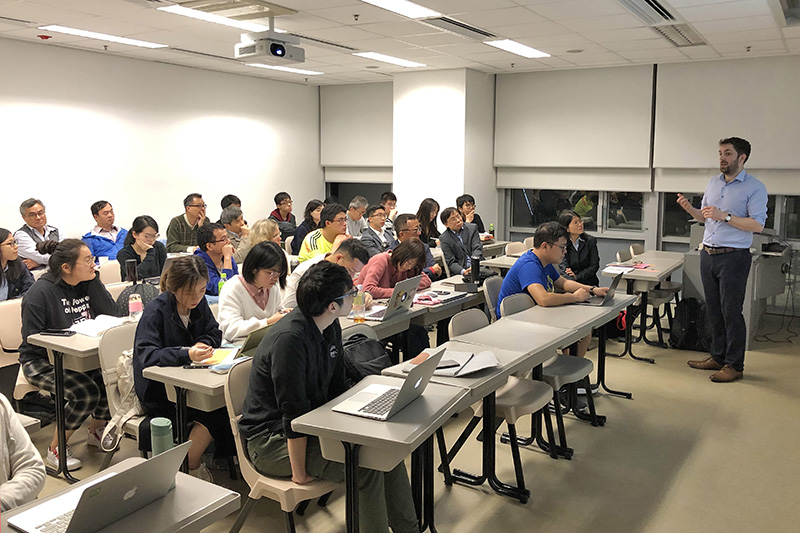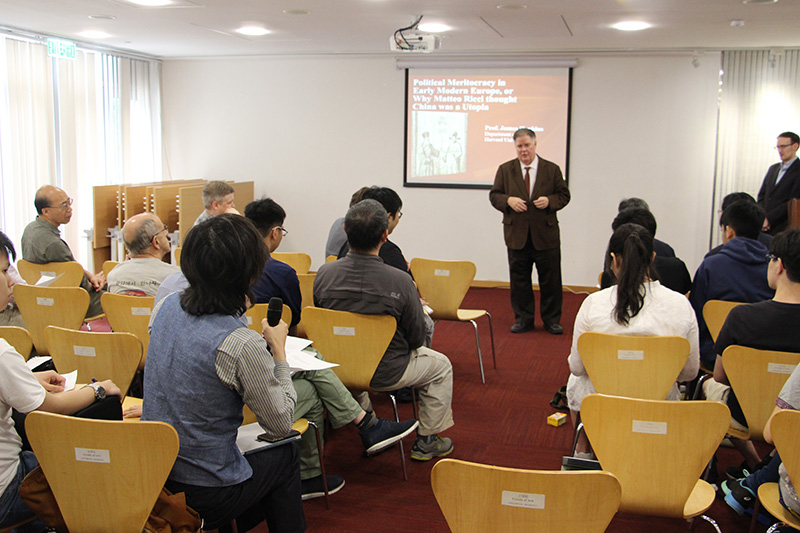Academic Activities
Recapping the Academic Seminar “Decolonization and the Making of New Shanghai, 1949-1976” conducted by Dr. Jonathan HOWLETT on 18 March 2019
Dr. Jonathan HOWLETT from the Department of History, University of York was invited by the Department to deliver a lecture entitled “Decolonization and the Making of New Shanghai, 1949-976” on 18 March 2019.
Dr. HOWLETT is interested in the “decolonisation” process in Shanghai by the Communist Party of China (CPC) after 1949, including the closures and takeovers of foreign diplomatic, business, cultural, and religious institutions, as well as its influence on the everyday life of the ordinary people. Dr. HOWLETT began the lecture with the story of a stateless foreigner who, without any identification papers, was refused entry by several countries after fleeing from Shanghai. In early 1949, Mao Zedong announced a foreign policy “sweeping the house clean before welcoming guests,” (i.e. to drive colonial forces out of China), the number of foreigners in Shanghai dropped from about 32,000 to 12,000 in 1950, and went further down to 3,000 in 1954. Dr. HOWLETT vividly portrayed some stories about how these ordinary foreigners were forced to leave Shanghai: they were labelled as “colonisers” but some spent most of their lifetime, or were even born, in Shanghai and had no “motherland” to return to. Those who were permitted to stay in Shanghai due to political and economic reasons (mostly white Russian and Jewish refugees, lived under close monitoring by the CPC government. Dr. HOWLETT argued that at the institutional level, the decolonisation process of China was different from other colonised societies due to its status as a “semi-colony”. However, it was still worthwhile to adopt a comparative perspective to elucidate the experiences of China in the global process of decolonisation after World War II, including the ways in which these processes influenced the everyday life of ordinary people and their sense of identity.
Welcoming Members from the Department of Regional Culture, Tottori University
Prof. Kunimitsu YANAGIHARA and Prof. Jeungah YU from the Department of Regional Culture of Tottori University visited the Department on 19 March 2019. They were received by Prof. LAI Ming Chiu, Department Chairman; Prof. HO Pui Yin, Prof. CHEUNG Sui Wai, Prof. CHEUNG Hiu Yu and Prof. HE Xi, faculty members of the Department. Members from both universities eagerly took the opportunity to discuss and share their views on learning and recent research. The visitors were given a deeper understanding of the Department’s latest developments and areas of excellence.
Recapping the Public Lectures on History and Business in China 2018-19 delivered by Prof. Jean-François HUCHET on 21 March and 22 March 2019
With the support of the Eminence History Department Fund of the Chinese University of Hong Kong, the Department invited Prof. Jean-François HUCHET, Professor of Economics and President of National Institute for Oriental Languages and Civilisations (INALCO), as the keynote speaker of “The Public Lectures on History and Business in China 2018-19”, to deliver two public lectures on Economic Reforms in China.
The first public lecture ““Objective 2049”: How to Overcome the Legacy of Deng Xiaoping in Reforming the Chinese Economic System? Between Necessities and Dilemmas” was held on 21 March 2019 at the Hong Kong Central Library and moderated by Prof. David FAURE. Prof. HUCHET reviewed the history of the opening and reform and pointed out the 14th National Congress of the Communist Party of China (NCCPC) in the 1992 was a crucial event. The “Legacy of Deng Xiaoping” refers to a series of principles that were established in that congress. The principles included getting rid of the planning system, keeping control of big state-owned enterprises, re-centralising the fiscal system and allowing rural migrant workers to work in the cities, etc. These principles supported the fast growth of the Chinese economy in the following decade but also gradually led to the revelation of some shortcomings. President Xi Jinping has pushed for a new series of economic reforms since the 18th NCCPC, but these new steps, in the context of slowing economic growth, residents’ high savings rates due to a lack of confidence in social security, and declining demographic dividends, are unlikely to shake the reform principles in place since the 14th NCCPC and surpass the legacy of Deng Xiaoping.
The second public lecture “40 Years of Economic Reforms in China: Towards Convergence with Western Capitalism?” was held on 22 March 2019 at Cho Yiu Conference Hall in CUHK and moderated by Prof. HO Pui Yin. Prof. HUCHET argued that traditional economic theories had long neglected the relationship between economic development and factors such as history, culture and geopolitics. As a result, it overlooked the diverse economic forms of capitalism. In the case of China, its unique political and social consideration in the areas of trade policy, privatisation and control over financial markets, were vastly different from other countries in East Asia. Therefore, it might be able to overcome the “middle income trap”, a term used by the World Bank, with its unique reform measures.
Recapping the Academic Seminar “Political Meritocracy in Early Modern Europe, or Why Matteo Ricci thought China was a Utopia” conducted by Prof. James HANKINS on 22 March 2019
Prof. James HANKINS from the Department of History, Harvard University, was invited by the Department to deliver a lecture to faculty members and students.
Prof. HANKINS specialises in Italian Renaissance and interests in Chinese-Western intellectual exchange. In the lecture, he discussed the influence of Matteo Ricci’s descriptions of China on the idealisation of Chinese politics in the Western world. Ricci’s descriptions were a major source of information for modern Western scholars in understanding Chinese politics. The parallels between Confucian and European humanist political thoughts were the reason behind Ricci’s admiration of the Chinese government. The theory of political meritocracy found similarity in Confucianism and its adoption in Chinese politics. Ricci tried to introduce Confucian political thought and the Chinese political system to the Western scholars in order to promote political meritocracy and criticise the European political system at the time.
Upcoming Events
Workshops for the First-Year RPg Students 2018-19
Date: 12 April 2019 (Friday)
Time: 9:30am-12:30pm
Venue: Room 101, 1/F, Fung King Hey Building, CUHK
Moderator: WANG Jiayao
| Presenter | Topic | Language |
| CHEUNG Shin Yee | 紡織考古與漢代絲綢之路貿易面目 | Putonghua |
| YI Shuihan | 唐朝前期實錄修纂研究綜述及選題研究進展 | Putonghua |
| TAN Xiaojun | 學以致聖:宋儒顏回論述中學的轉向 | Putonghua |
| SEE Wing Yin | 北宋中期祭天禮儀改革的政治意義 | Cantonese |
| YIP Kin Fu | 「洛蜀朔黨」新考 | Cantonese |
| FONG Wai Man | 向民主吶喊:《自由人》與香港第三勢力運動研究 | Putonghua |
Date: 12 April 2019 (Friday)
Time: 2:30pm-5:30pm
Venue: Room 101, 1/F, Fung King Hey Building, CUHK
Moderator: WANG Jiayao
| Presenter | Topic | Language |
| WANG Yiqiaog | 海洋貿易中的廣州:從朝貢貿易到天子南庫 | Putonghua |
| WANG Yongxi | 明清陝西清峪河流域的水利爭端與地方社會 | Putonghua |
| LAN Tu | 甘州府南部的番漢問題和水源地問題 (1725-1911) | Putonghua |
| WU Ziqi | 國民革命中的法國殖民管治:國民革命軍南征與廣州灣租借地 (1924-1926) | Putonghua |
| GUO Yejia | 「殤女」?「悍婦」?:官方語境下惠安女性的風俗改良與形象建構 (1912-1949) | Putonghua |
For enquiry, please call 3943 8541.
For teachers and students who have information to share with the Department,
please email your articles in both Chinese and English to chanfiona@cuhk.edu.hk by 4:00pm every Tuesday.
















